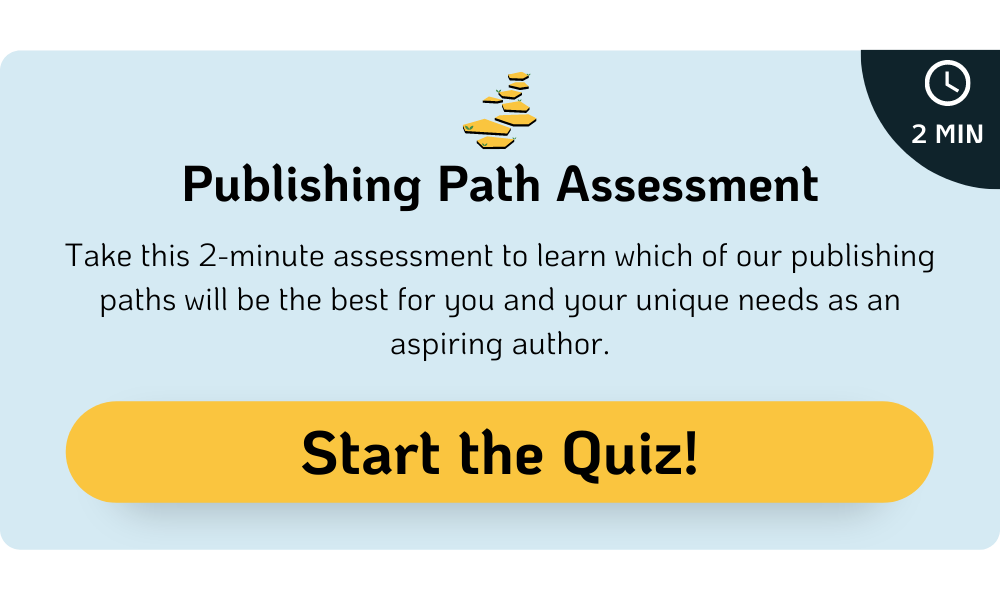Amazon self-publishing is on the rise. And as the number one retailer for books worldwide, that makes sense.
But if you wind up making some errors in the Amazon self-publishing process…let’s just say your results as an author will be less than satisfactory.
After all, the self-publishing industry is pretty sensitive to those making mistakes.
But Amazon self-publishing is still the best option to self-publish – and we’ve made it even easier for you with this guide for doing it with Kindle Direct Publishing.
You no longer need to go through painstaking efforts to land a book deal, which locks you into unrealistic deadlines and cuts you out of most of your well-deserved earnings.
You can now have complete control of your book (and its revenues) by self-publishing using Amazon’s KDP platform.
But many writers get overwhelmed by the abundance of information about self-publishing. It can be intimidating for first-time publishers.
We get it – we were just like you!
So to ease some anxiety and uncertainty, we created this step-by-step comprehensive Amazon self-publishing guide so you can easily get your book published on Amazon’s Kindle Direct Publishing Network.
If you find yourself overwhelmed with the process while reading, you can simply skip to the bottom of this blog can book a call with our team. We are happy to walk you through each step of the self-publishing journey.
Ready? Let’s get started!
This Guide to Amazon Self-Publishing Will Cover:
How Does Amazon Self-Publishing Work?
Traditional publishing is on the way out.
This has been the reality for some time now (and for good reason).
While traditional publishing had its time and was once the only option for publishing a book, the new system of self-publishing levels the playing field. When done right, self-published authors can make more money, retain all their rights, and leverage their books in more ways than ever before.
Though traditional publishing is still a viable option for some, Amazon self-publishing is the best option, and here’s why:
- Over 70% of books are sold on Amazon
- There were 310 million book buyers on Amazon last year
- Those buyers accounted for over $178 billion in sales
- It’s easier and faster to publish with Amazon self-publishing
[Pssst! Want to see some of our students’ self-published books? Check out the SPS library here!]
There are major differences between self-publishing vs traditional publishing with the majority of authors opting to take their talents to Amazon instead of through one of the Big 5 publishing houses. But how much will it set you back? Let’s take a look at the costs involved with Amazon self-publishing.
How much does it cost to publish a book on Amazon?
Nothing! It’s free to use the Amazon self-publishing platform. You pay no upfront costs, but Amazon will take a portion of your book’s earnings to print, leaving you with 60% royalties after the book print price, which is why authors are making more now than ever before.
If you set your book’s price to $17.99 on Amazon, there will be a $.85 printing fee for 100 pages, plus $.012 for each additional page. You will make 60% of the list price, and the printing fee will be subtracted from that to give you your total amount of earnings:
$17.99 x .60 = $10.79 royalties per book
Subtract the printing cost from your royalty rate to get our take-home pay (based on a 300-page book):
$10.79 – $3.25 = $7.54 take-home per book
So while you don’t pay anything to publish through Amazon, they do still charge for the book’s printing costs.
By now you must be thinking that Amazon self-publishing is a good deal, so let’s take you through a step-by-step guide to publish your book successfully using KDP.
How to Master Amazon Self-Publishing in 8 Steps
Anyone can use the Amazon self-publishing platform, but that doesn’t mean the book will actually sell. You have to know the specifics, from setting up your KDP account to the pricing of your Kindle eBook.
If done correctly, you can expect a successful launch, and with multiple books published this way, you may even make a living writing books.
Here are our steps for successful Amazon self-publishing:
1. Create a Kindle Direct Publishing (KDP) Account
Before you can get started with Amazon self-publishing, you first have to have an account set up with them.
Here’s how to set up your Kindle Direct Publishing account:
- Go to https://kdp.amazon.com and register with either your Amazon account or your email address.
- Next, click “Update” in your account information and fill in your tax information. It’s important to note that you need to complete your tax information BEFORE you can publish your first book. So don’t skip this step!
- Once your tax information is complete, click “Finished” and return to the main page.
- Your profile is complete!
With your KDP account setup, proceed to
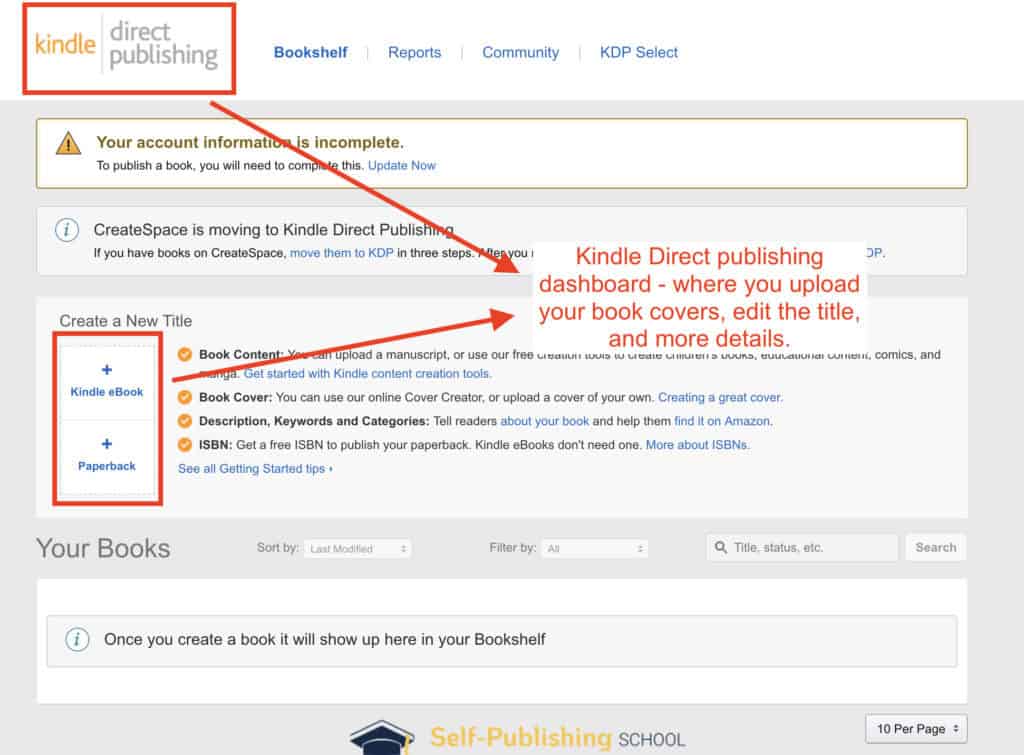
2. Choose a Book Title and Subtitle
In your Kindle Direct Publishing profile, you need to fill in the title and subtitle of your book.
While a subtitle is optional, having a good subtitle is something you should consider to bring in more views, create stronger intrigue, and help people find your book when searching.
Here are a couple of tips for crafting a great book title:
- Use a Book Hook: Your book hook should speak to the reader in a unique voice that grabs their attention and feeds into what they are looking for.
- List the Benefits: Your potential readers want to know what they will get from reading your book. One technique is to deliver the benefits in the subtitle, providing enough tantalizing information to further attract readers.
Think about what you would be attracted to in a book title for the particular genre you’re writing in.
Keep it simple, clear, and unique. Research the title you want to use and make sure it hasn’t been scooped up by a high-performing book already.
You don’t want to make competition for yourself.
3. Write Your Book Description for Amazon
You need a powerful book description in order for potential buyers to read what it’s about. Amazon self-publishing requires more signals than you’d initially realize. Even though the cover and subtitle should do a great job of this, we all want more information when it comes to putting money toward something.
Here’s what people notice first when seeing a new book:
- Title
- Cover
- Book Description
A description is essentially a short written narrative that illustrates what your book is about. It should be written like a sales page to capture the interest of your reader. Amazon is very sensitive to showing visitors relevant books based on their previous actions.
This is crucial because the description, in many cases, is the final factor that determines whether the reader will read your book or not. That, and great Amazon reviews.
When done correctly, a well-written book description can practically sell a book on its own.
Here are some strategies to help craft your perfect description:
- Make your first sentence as enticing as possible
- Write your description like a sales page or advertisement, not a dry summary of your book
- Have the description feel personal and empathetic
- Detail the benefits your reader will gain by reading your book
Here’s a great example of a full book description on Amazon:
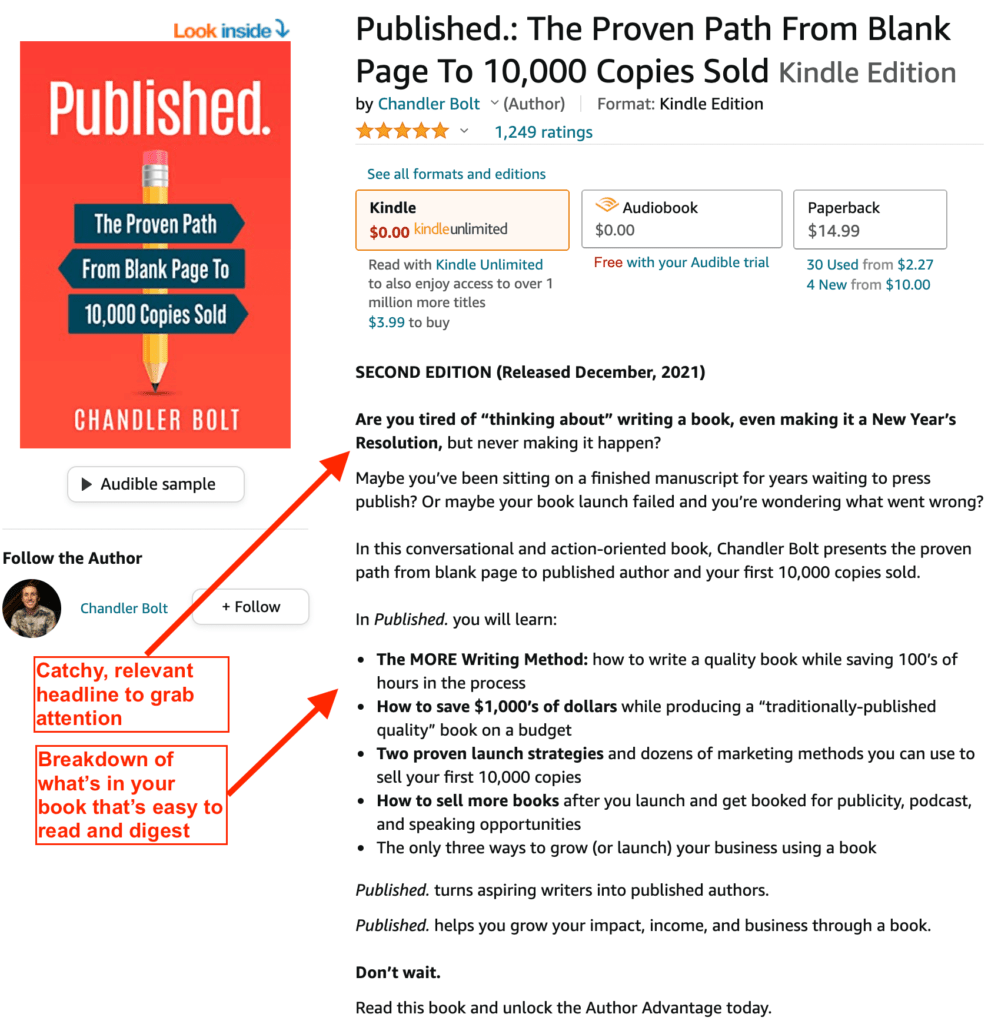
You can find more amazing description examples with these books:
- Champion Mindset: Tactics to Maximize Potential, Execute Effectively, & Perform at Your Peak – Knockout Mediocrity! By Patrick King
- Novice to Expert: 6 Steps to Learn Anything, Increase Your Knowledge, and Master New Skills by S.J. Scott
Spend some time crafting your eye-catching book description for the Amazon self-publishing platform. It will make your book stand out to your readers and motivate them to purchase your book.
This is also a great video about how to write an Amazon book description to get sales:
4. Choose Your Amazon Keywords
If you want your book to show up in Amazon and Google search engines, you’ll need the right mix of keywords. Since Amazon self-publishing only allows seven keywords per book, keyword selection requires strategy.
But what are keywords exactly?
Keywords are specific words or phrases used to describe your book. If someone was looking for a book on your topic, they might type one of those keywords into Amazon or Google in order to find it.
Amazon self-publishing is all about becoming relevant in the niche you need to be. This not only gets you the type of readers you want, it also helps tremendously to have the correct visibility.
For example, if your book is about perseverance, you might find keywords like this useful:
- how to have perseverance
- what is perseverance
- perseverance examples
- persevering
- persevering when it’s hard
These are all phrases or words people looking to better themselves with perseverance would type into search engines in order to find what they’re looking for, like in the image below.
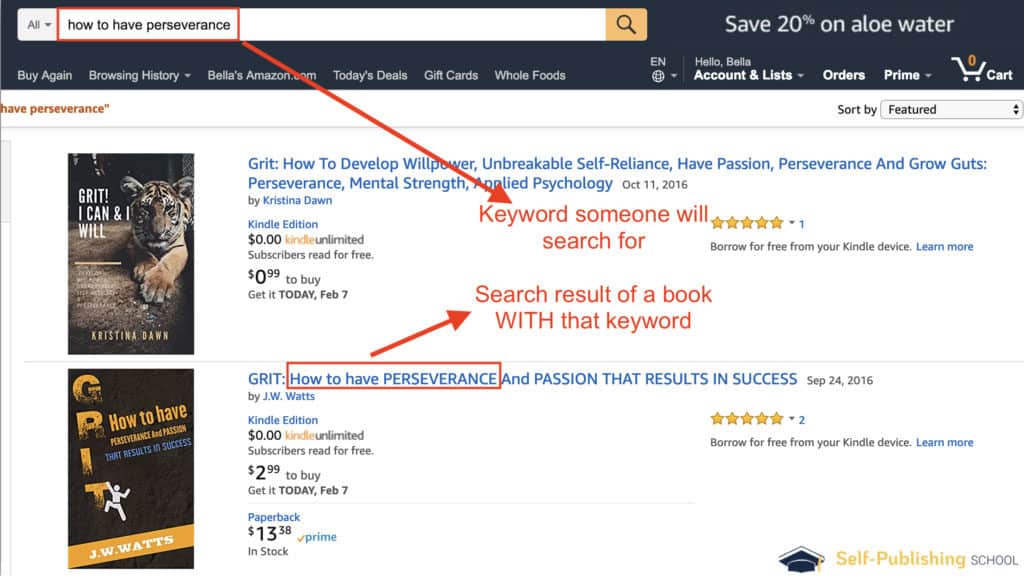
Amazon Keyword Research Tools
- Publisher Rocket: This is a great tool for comparing Google search results to Amazon. It gives you a competitive score from 1-99, keyword results from both Google and Amazon, and how much money other books are making. You can check out this Publisher Rocket Review.
- KW Finder: This tool gives an analytical view of the keyword popularity using a competitive ranking. You can search for five keywords for free per day.
- Amazon’s Autofill Function: Take advantage of Amazon’s search box to find good keywords. Amazon’s suggestions are based on search history so you want to search for words that are high in demand with little competition.
- Google Search: Google is still the king of search, you can easily check to see if there are authors ranking in search results. You’ll want to understand the best angle even outside of Amazon.
Make a list of possible keywords for your book, then leverage the tools above to test your keywords. Putting in the time to get keywords right will have your book rank higher and appear more frequently to readers.
5. Select Your Amazon Categories
Amazon self-publishing provides you with a collection of categories and subcategories to choose from. Like keyword selection, your goal is to look for trending areas that don’t have tons of competition.
If you visit your book page, these categories will appear partway down the page, displaying the rank like in the image example below.
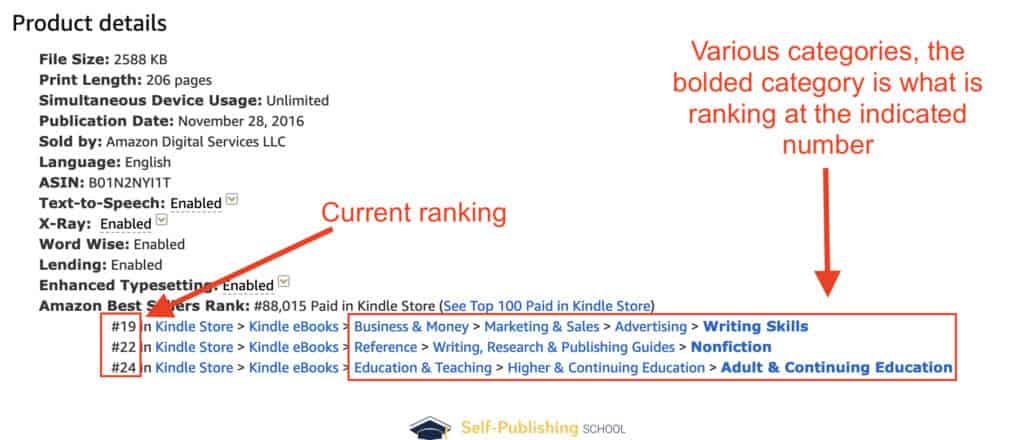
These categories are what you will rank as a bestseller in, which is why you want to make sure you pick fitting categories that are specific, but also not super competitive. You want to stand out. That said, these do have to match the intent of the book you wrote.
Amazon’s sales ranking measures how well a product is selling compared to its competitors. All books that are ranked 2,000 or less are considered to be highly purchased products in that particular category.
Here are a few tips when publishing on Amazon in order to rank in more categories:
- Research your competitors’ keywords
- Choose trending categories with lower competition
- Acquire additional categories by contacting Amazon and asking for keyword placement
Unless you have an established author platform with significant downloads and reviews, try to aim for categories with books that rank between 10,000-30,000.
Do you want to know how to rank for ten categories? Check out our blog post that details how to get approved for more categories on Amazon.
We also did a fantastic podcast episode with Dave Chesson of Kindlepreneur (and the creator of Publisher Rocket) to teach you how to find the best categories for you on Amazon self-publishing. Check it out below:
6. Upload Your Manuscript to Amazon
In order to succeed at Amazon self-publishing, you have to make sure your manuscript is in the right format to be uploaded to Amazon. Usually, your formatter will do this for you, but if you’re not sure or have self-formatted your book, these are Amazon’s recommended formats for uploading your manuscript:
- Recommended Amazon Publishing Formats:
- Supported Formats:
Here’s how to upload your book to Amazon for publishing:
- In your Kindle Direct Publishing account, go to “Your Bookshelf”.
- Locate and click on “Kindle eBook Actions” next to the title of your book.
- Locate and click on “Edit eBook Content”.
- Click on “Upload eBook manuscript”.
- Upload your manuscript file on your computer.
- Upload complete!
Once Amazon finishes uploading your file, a confirmation message will be sent and you can preview the uploaded file to check for any errors.
You can upload the manuscript as many times as you want and the new version will override the existing one.
It’s important to check how your book looks using the “Look Inside” feature once the book is live on Amazon. This feature is often the first thing your prospective readers will click on when checking out your book.
If the formatting is off here, it can deter readers from picking up your book. Take this extra step to make sure your formatting looks good here too or consider hiring a professional ebook formatter.
7. Create Your Book Cover
When it comes to publishing a successful book on Amazon, having an attractive book cover design is one of the most important aspects to get right. Contrary to what we were told growing up, people do, in fact, judge a book by its cover. It’s actually one of the biggest deterrents.
Your cover is exactly how your book will be judged at first glance.
Make sure that your cover is created professionally and that it will stand apart from the rest of the books in your genre or category. With our new done-for-you cover design services, we can actually handle your book’s design for you. You can book a call with our team and find out more about these done-for-you services.
You can find cover creators on freelancing sites such as:
Prices will depend on the level of service, but these sites will give you plenty of amazing graphic designers to choose from! It’s a great investment that will make your book stand out perfectly on the Amazon self-publishing platform.
Depending on what program they’re in, Self-Publishing School students can have the cover designed for them or receive a list of qualified, trusted book cover designers they can work with directly in order to get a worthy cover.
Make sure to do your research regarding what type of book cover does best in your genre. If you write fantasy books, for example, it will be a lot different than writing a memoir or even historical fiction.
8. Price Your Book
A question often asked is: “How should I be pricing my book after the initial launch is over?”
This is up to the author, but generally, the best range to have your book priced at when using Amazon self-publishing is between $2.99 to $9.99.
The royalty payments vary depending on the country, but you can learn more on KDP Select pricing page.
One popular strategy for beginners is to price your book at $2.99 and gradually increase it by $1 per week. At some point, your sales will begin to dip. And while that’s normally a negative statistic, in this case, it confidently tells you the perfect price of your book that guarantees a profit.
Here are the 4 main pricing strategies to consider in order to be competitive and sell books:
- Know the price of your competitors. Compare the list price of your book to the books around you and determine if you would be able to sell your book for a higher price.
- Know the size of your followers. Famous authors can charge a lot for their books because they have a big following. Your book should be priced lower to encourage new readers to buy your work if you’re not in this category.
- Determine price based on the size of your book. Size does matter when it comes to books. Don’t charge $20 for a 75-page book. Customers will immediately be turned off by the lack of content at that price point.
- Measure price based on reviews. Reviews carry a big weight on influence, and are social proof that your book has been read and well received. Therefore, a book with more reviews (1000+ reviews) can be priced higher compared to a book with fewer reviews (30+ reviews).
You can get legitimate and honest book reviews from:
- Your personal launch team
- Amazon’s top reviewers
- Fans of your social media page
- Personal email list
- Adding a note to leave a review in your book
Amazon Self-Publishing Summed Up
So there you have it! You now know all the steps you need to take to launch your book successfully on the Amazon self-publishing platform. No more waiting for a publishing house to notice you. No more questioning how to get your book out there. This is a tried, true, and simple roadmap to success.
Of course, we use the word “simple” loosely here. You still have to actually write your book, and the Amazon self-publishing process can be confusing, even with the step-by-step breakdown. If you find yourself feeling overwhelmed at any step in the process, you can book a call with our team and we can handle all the steps for you!
(Except the writing of course.)
And, if you need help deciding how you’ll publish your book, you can take the assessment below to get direction.
